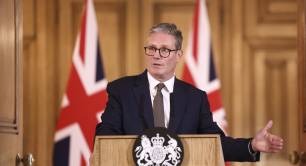The Editor's Post: How the green transition can be a success for all

The green transition can be win-win for people and planet, but practical examples are important, otherwise the fight against climate change will be very hard to sell – and our top story this week is a demonstration of how it works. This week's view from the Pioneers Post newsroom.
We hear a lot about the just transition – a transition to a low-carbon, environmentally conscious economy that leaves no one behind. But many examples show that looking after the planet can do much better than that: it can help people move forwards. Our top feature this week brings you an example of how it’s done – and at scale.
Social enterprise the Sea Ranger Service, which operates in the Netherlands and the UK, has identified two issues: the lack of services to look after marine ecosystems, and high youth unemployment in coastal communities. And it found that solving one problem could solve the other.
By providing training to young people in jobs related to the protection of the ocean – from nature surveying to re-planting native species of seagrass – it equips them with the skills to work in the marine industry. Once fully trained, they are kept in paid positions for a period of time, enabling the business to deliver government contracts for marine conservation work, which public authorities are unable to fulfil on their own.
Successful investment and an international franchise system will enable the model to be developed at scale: the Sea Ranger Service, which has employed 172 young people since its inception in 2018, aims to increase this number to 20,000 and restore one million hectares of ocean biodiversity by 2040. This story is a demonstration that solutions to social and environmental issues go hand in hand: the green transition must be a just transition, but if we're smart, there are solutions that can be a success for all.
Three letters, so many problems
Along the same lines, Klara Koslov criticises how the concept of “ESG” (“Environmental, Social and Governance”, used as shorthand for factors taken into account in sustainable business and finance), by its nature separates social and environmental impacts – which, as we see in the Sea Rangers example, doesn’t make sense.
In an opinion piece this week, the managing director of Big Issue Impact Advisory argues that the “S” tends to be neglected, often because of the lack of clear metrics to address the complexity of social impact. She suggests starting to identify the issue before coming up with solutions, which can seem an obvious thing to do but is not always the case. Because if communities don’t feel the positive impact that business can have on their own problems, the “E” and “G” will be very difficult to sell.
“If we fail to demonstrate the relationship between people and the planet to achieve sustainable growth, then we risk polarising the debate as a series of trade-offs rather than an inclusive opportunity for all,” Koslov writes. What do you think? Tell me.
Top stories
All hands on deck: The social enterprise deploying young people to protect our seas
Opinion: Why investors want to see an ‘I’ in ESG
WISE Lunchtime Takeaways webinar: ‘If you want equality, it’s going to cost’
The Impact World This Week, 25 July 2024
Top image: courtesy of Sea Ranger Service
Thanks for reading Pioneers Post. As an entrepreneur or investor yourself, you'll know that producing quality work doesn't come free. We rely on our subscribers to sustain our journalism – so if you think it's worth having an independent, specialist media platform that covers social enterprise stories, please consider subscribing. You'll also be buying social: Pioneers Post is a social enterprise itself, reinvesting all our profits into helping you do good business, better.




